- Home
- Gerald Durrell
Two in the Bush Page 10
Two in the Bush Read online
Page 10
After much running to and fro with cables and microphones, he proclaimed that he was ready. Our job was simple: we had to drive the Land-Rover to a given point, get out and start to shout for keas, our action being picked up by the camera whilst the recorder captured for posterity the sounds of our voices echoing back from the mountains. Now, as I have said, you could not wish for a more desolate and deserted spot. Not only was there no human being or human habitation in sight, but there was no animal life either, so it was with considerable astonishment – when we left the Land-Rover and started to call for the keas – to hear a sudden clanking uproar that sounded like a Ford factory gone mad. It was the scream and grind and crash of machinery tortured beyond belief. None of us could imagine what was causing the noise or where it was coming from. All we knew was that Chris was squatting by the recorder, earphones clapped to his ears, with a look of disbelieving anguish on his face.
Then, from around a great tumbled heap of rocks, there appeared an enormous vehicle, the great-grandfather of all bulldozers, a gigantic thing half the size of a house which shuddered and roared and clanked its way towards us, while perched on a tiny saddle on top was a small, grizzled man who appeared to have some slight control over it. He waved to us cheerily as the monstrous machine shuddered towards us. Chris tore off the earphones and rushed up to the side of the juggernaut, waving his arms wildly.
‘Shut it off,’ he screamed, ‘we’re trying to record a sound take.’
‘Aye?’ yelled the little man, changing gear with a screech that made the blood ran cold.
‘We’re filming . . . can’t you shut it off?’ bellowed Chris, now purple in the face.
‘You’ll have to speak louder . . . can’t hear,’ explained the little man.
‘Turn the bloody thing off . . . TURN IT OFF!’ screamed Chris, making wild gestures. The little man gazed at him thoughtfully, played another brief but excrutiating tune on his gear box, and then leant forward and pressed a switch and the great machine fell silent.
‘Now, what were you saying?’ he enquired. ‘Sorry I couldn’t hear you very well up here – it’s a bit noisy.’
Chris drew a deep, shuddering breath.
‘Could you keep that . . . that . . . thing switched off for a few minutes? You see, we’re making a film and trying to record sound.’
‘Oh, a film, eh?’ said the little man interestedly. ‘Yes, sure I can keep her off.’
‘Thank you,’ said Chris shakily, and went back to the recorder. He had just put the earphones back on and given us the signal to begin when the monstrous machine suddenly started up again, only now, by some magical means, the little man had put it into reverse and it was slowly disappearing behind the pile of rocks from whence it had sprung. Chris, his face now congested to the colour of an over-ripe peach, flung the earphones on the ground and, mouthing what appeared to be terse phrases of a sort which no BBC producer is supposed to know, pursued the gigantic machine behind the rock pile. After a moment, blessed silence reigned and Chris reappeared from behind the rocks, mopping his brow.
‘Now,’ he said in a hoarse voice, ‘we’ll try it once more.’
This time we did succeed in getting the shot, but the episode had its detrimental effect on Chris’s nerves and he tended to leap like a startled deer at the slightest noise for the rest of the day. His condition was not improved by the fact that we did not see any more keas and so we returned to the hotel steeped in the deepest gloom. In fact, so depressed did we look that our charming Maori maid was moved to enquire tenderly what was the matter. Delighted at having a sympathetic audience, we all spoke at once. When the babble had subsided somewhat and she could make out what we were talking about, she looked at us in amazement.
‘Keas?’ she said bewildered. ‘You’ve been trying to film keas? But why didn’t you tell me?’
‘Why?’ asked Chris, suspiciously.
‘I’ve got five wild ones that come down to the back of the hotel every morning,’ she said. ‘I feed them on bread and butter. Every morning they’re there.’
As an anti-climax this left little to be desired.
The next morning at dawn we prowled around the back of the hotel armed with cameras, tape recorders and a lavish supply of bread and butter which, in some mysterious way, managed to adhere itself to almost every piece of equipment and most of our clothing; sure enough, when the morning mists rose and Mount Cook appeared, its snowcap pink in the morning sun, we heard the wild cries echoing among the rocks at the foot of the ridge of mountains that rose at the back of the hotel. They were, in essence, not unlike the cries that we, at the risk of acute laryngitis, had attempted to emulate, but they had a wild, ringing, exuberant quality about them that we could never have matched. Very soon the five keas appeared, flew on to the roof of the hotel, and proceeded to march up and down, watching us and shouting ‘Kea . . . kea . . . arrar’ at intervals. Their strutting, pompous walk, their general attitude of being the lords of all they surveyed, combined with this oft-repeated and never varying cry, made them remind me irresistibly of a small group of Fascists. At first sight they looked very like the kakas we had seen on Kapiti, but as the sun rose I could see that, although they were like them in shape, they were quite different in coloration. Basically, the kea’s plumage is a melody of greens, ranging from grass green to sage, but with a purplish bloom to it that, from a distance, makes them look quite dark. The underside of the wing is the most beautiful, clear flame orange and when the bird spreads its wings, or takes flight, it looks as though it has, for one brief moment, burst into flames.
Having at long last arrived within camera range, the keas proceeded to give us a wonderful performance. They engulfed bread and butter in vast quantities, they ran along the guttering of the hotel and hung upside down, shouting, and then took it in turns to skid down the slope of the roof like children on a snow slide. They yelled and screamed and engulfed more bread and butter, and then tried valiantly but unsuccessfully to remove the top from the Land-Rover. Tiring of this engineering feat, two of them flew off and went and shouted ‘Kea!’ loudly and shrilly outside every bedroom window they could find, while the rest of them dismantled a fascinating pile of cardboard boxes they discovered outside the back door of the hotel. They were irresponsible, noisy, devilish and altogether charming birds, and as I watched two of them, their beaks covered with bread and butter, fighting over the privilege of sliding down a roof, screaming abuse at each other, crests up and wings flapping so that the orange feathering glowed in the sun, making them look more like an animated bonfire than anything, I reflected what a pity it was that, charming though I found him, the kea was considered by many in New Zealand to be Public Enemy Number One. Keas have developed a taste for the fat of that domestic animal which comes closer to a New Zealander’s heart than his mother: the sheep.
Now, when he finds the skin of a sheep, or even the corpse of one, there is no doubt that the kea will feast on the fat, but the sheep farmers insist that he does more than this – that he actually attacks and kills living sheep to get at the fat. There are authentic cases of keas having done this, but whether all keas do it, and whether – if they do – they produce the amount of damage that the farmers claim, is a subject that has never been scientifically investigated. Tell the average sheep farmer this, or elaborate it by saying that you think it’s worth losing a few sheep for the pleasure of having the keas around, and you are qualifying yourself for a swift ambulance ride. And yet the kea – large, beautiful, noisy, full of character and mischievousness – personifies the wild mountain country of New Zealand. He is a gay and wicked clown, a bird to be proud of. Instead of which there is – as there is for so many nice things in this life – a price on his head, and he is shot wherever he is found.
As a last vignette of New Zealand I offer you this: a backdrop of Mount Cook, wearing a tattered hat of pink snow; wisps of morning mist drifting languidly along the mountainsides, coiling gently round the great boulders, covering the scars made by r
ecent landslides; and flying against it, arrow swift and eager, a group of keas, their wings flashing in the sun, their joyful shouts of ‘Kea . . . kea . . . kea’ echoing and ringing among the ancient rocks.
PART TWO
The Attic of the World
The Arrival
Distinguishing those that have feathers, and bite
From those that have whiskers, and scratch.
Hunting of the Snark
The good ship Wanganella that carried us staunchly from New Zealand was, without doubt, one of the most charming vessels I have ever travelled in. I decided at length that it must have been designed by an economy-minded film company who had wanted to try to get as many styles as possible, ranging from Elizabethan to slick 1920 décor (taking in the worst of the French kings and the Edwardians en route), into one ship. Everywhere you went there were doors labelled ‘Tudor Lounge’ or ‘The Palm Snuggery’, and, to your astonishment, when you opened the door there really was a Tudor Lounge or a Palm Snuggery. It was worth travelling on the ship just to see the mosaic pillars in the dining saloon, which were of such ostentatious vulgarity that they were charming. It was on this interior decorator’s nightmare of a vessel that we met Gert.
When we had completed dinner and finished admiring the mosaic columns, we went into a sort of Shakespearean library, full of oak beams and faded bound copies of Punch, to have our coffee. As we drank we surveyed such of our fellow passengers, as were visible, with a practised eye, for after a few years’ travelling on ships you develop a sort of sixth sense about which passenger is going to turn out to be the ship’s bore and which one is going to try to inveigle you into deck games and so forth. After a slow and careful scrutiny, I turned to Jacquie.
‘There is only one person here worth cultivating,’ I said firmly.
‘Which one?’ asked Chris, who was new to this game.
‘The one sitting over there under the Tudor warming-pan.’
Chris and Jacquie surveyed my choice and then turned to me in astonishment. They were not altogether to be blamed, for at first glance the woman I had selected looked not unlike a medium-sized hippopotamus clad entirely in pink and wearing a blonde wig of a hue that would have put any over-ripe cornfield to shame. Her small, fat hands, glittering with rings, clasped a glass full of what appeared to be gin, and she stared into space out of circular blue eyes so heavily ringed with mascara that she had the appearance of a doll.
‘You’re nuts!’ said Chris, with conviction.
‘He just can’t resist blondes of any size,’ explained Jacquie.
‘I’ll prove to you I’m right,’ I said and walked over to where my choice sat, still staring moodily at the oak beams.
‘Good evening,’ I said, ‘sorry to worry you, but can you give me a light?’
‘What the bloody hell for?’ she enquired with interest. ‘I saw you light your bleeding fag with a lighter five minutes ago.’ Her voice was rich and foggy, the sort of voice that only comes by years of tender application of gin to the vocal cords. I decided that I had underestimated the alertness of my lady friend.
‘I just thought you looked nice,’ I confessed, ‘and I wanted to have a drink with you.’
‘Cor, picking me up at my age – you’ve got a bleeding sauce,’ she said with amusement.
‘Oh, it’s quite all right,’ I said hastily, ‘that’s my wife over there.’
She shifted her ample bottom slightly so that she could crane round a particularly repulsive aspidistra and see our table.
‘All right,’ she said, giving me a sudden mischievous and strangely sweet smile, ‘I’ll ’ave a drink with you . . . at least you all look alive . . . dead crowd of bleeders I’ve seen so far on this ship.’
She surged to her feet and waddled across the room in front of me, and then, introductions having been made, she wedged herself into a chair with certain difficulty and beamed at us all impartially. When drinks had arrived, she seized her glass and held it aloft.
‘’Ere’s ’ow,’ she said, drank deeply, stifled a small and ladylike belch, patted her mouth with a scrap of lace handkerchief and settled herself so deeply and tightly in her chair that I felt nothing short of explosive would ever remove her from it.
‘It’s nice to be matey,’ she said, just loudly enough to be clearly heard by the people at the next table. ‘There was I thinking what a toffee-nosed lot of bastards there was on board, and then along you comes.’
That moment set the seal on our trip aboard the Wanganelia, for Gert turned out to be all and more than I had anticipated. Thrice married and now a widow, she had been, during her years in Australia, practically everything one could think of, but the two most unlikely and likely callings were those of doctor’s receptionist and barmaid. In the latter capacity she had met with the success she obviously deserved, and now owned her own pub in some remote part of Australia. But it was Gert’s medical abilities that fascinated us more than anything. During her time with the unfortunate doctor who employed her she must have driven him very close to a nervous breakdown, for she had been utterly convinced that his ability to diagnose was non-existent, and that any treatment he saw fit to recommend to his customers was based on this faulty diagnosis plus an insufficient knowledge of how the human frame functioned. She had, however, picked up a wonderful series of medical malapropisms, the origins of which she must have learnt from her wretched employer.
‘’E ’ad no confidence, that was ’is trouble,’ she confessed to us. ‘’E was a bloody nice bloke, but ’e ’ad no confidence. I always said to ’im, I said, “you ’ave no confidence, cock, you’re always passing the bleeding buck to others.” Now, a woman would come to ’im with a bun in the oven. Perfectly ordinary, you’d say, but no, off ’e’d pack ’er to a geologist.’
‘A what?’ we would enquire, breathless with anticipation.
‘A geologist . . . you know . . . one of them fancy bleeders that thinks they know all about females’ guts . . . prod about your ovaloids and there’s five guineas up the shoot.’
Gert on almost any medical subject was gorgeous.
‘’Ad a Yid come once, said ’e wanted ’is bleeding flap off. I said I thought they did that at birth with Yids, but ’e said no, that ’is family had defecated and become Christins and now ’e wanted to become a bleeding Yid again. So, anyway, we took ’s flap off and I went to see ’im in hospital . . . thought ’e’d feel a bit strange, see? Cor, the bleeding fuss . . . you’d think we’d taken the bleeding lot off. I told ’im ’e was lucky not to catch that elephantus . . . saw a picture of that in one of the Doc’s books once . . . bloke with a screw-tum the size of this chair . . . ’ad to carry it around in a sort of cart thing . . . blimey, I says to this Yid, think yourself lucky. Trouble with ’alf these people, they don’t know ’ow lucky they are.’
I wondered how many of them realised how lucky they were to have Gert around when they were ill.
So, aided by Gert and the exquisite decor of the ship, we passed a very pleasant Alice-in-Wonderland type voyage, until the Wanganella finally, and with a great flourish, landed us at Sydney. As we were landing we were treated to one final burst from Gert. A female of indeterminate age had been, throughout the voyage, flaunting her one and only asset at any and every man she could find, and this Gert had watched with the sternest disapproval. It so happened that this female, carrying, as it were, all before her, was going down the gangway ahead of us. Gert, thrusting her pink moon face over the rail for a final goodbye, caught sight of the well-endowed (whether by nature or artifice) female ahead of us. Her face pursed up into a look of disapproval as she followed the female’s bulging descent of the gangway. Then she looked at us and winked.
‘Finest set of mummery glands now arriving in Australia,’ she bellowed happily.
The success of our arrival was assured after that.
Lyrebirds and Leadbeaters
They sought it with thimbles, they sought it with care;
They pursued it with forks an
d hope.
Hunting of the Snark
We all fell in love with Australia completely and instantly. If ever I was compelled to settle down in one spot – which God forbid – Australia is one of the few countries I have visited that I could choose.
We drove down from Sydney to Melbourne under a brilliant blue sky striped with fragile wisps of cloud. The countryside was rolling, sun-bleached grassland, with here and there the rust-red earth showing through. Dotted about were copses of eucalyptus trees, their trunks – from the distance – gleaming white in the sun like bleached bones. They are extraordinary beautiful and graceful trees that manage to contort their trunks and limbs into the most incredible postures, so that they look as though they are taking part in some fantastic ballet. On some of the older trees the bark was peeling off, hanging down in great, beard-like festoons, the new bark underneath having a delicate pink glow when you examined it closely, so that you could almost imagine that the trunk was modelled out of flesh. Towards evening on the second day we stopped to have some tea. In the great, golden grassfield there was a group of dead eucalyptus standing, their trunks and branches as brilliant white as coral, and meandering through them the rough red road up which we had driven the Land-Rover. The sinking sun was washing the whole scene in a delicate yellowish haze and suddenly, out of nowhere, a flock of six galah cockatoos appeared, swooping down out of the sky to land in the dead trees above us. Seen in that light and against the background of the brilliant white tree trunks, they were incredibly beautiful, with their white crests, pale ash-grey wings and rich, dusty pink bodies and faces. They ambled along the branches in the faintly reptilian way that members of the parrot family have, peering down at us, muttering incoherently and raising their crests. As we did not move but sat spellbound, watching them, they eventually decided that we were harmless and they flew down on to the ground in a tumble of pink and grey feathers that made them look like bundles of rose petals. They settled on the red earth and slowly waddled along to where, in a deep tyre track, a pool of rainwater gleamed, and there they drank greedily. Then one of them found a delectable morsel in a grass tuft and a disgraceful fight broke out over its ownership. They yarred at each other with open beaks, circling round and flapping their ash-grey wings. Eventually they flew off in a swift, arrow-like flight, their breasts gleaming against the blue sky. Galahs are one of the smaller, but one of the most beautiful of Australia’s cockatoos, and as I watched them wheeling against the sky I wondered how anyone could have the heart to shoot them, and yet I knew that in certain areas they are considered a pest and are shot in vast quantities every year.

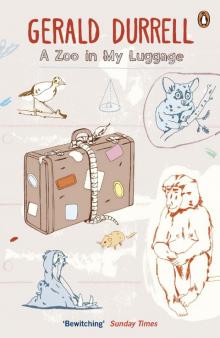 A Zoo in My Luggage
A Zoo in My Luggage The New Noah
The New Noah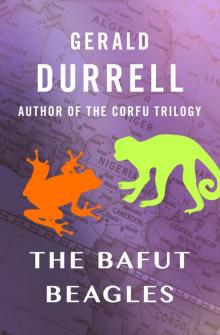 The Bafut Beagles
The Bafut Beagles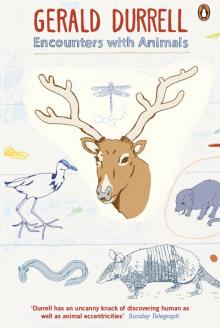 Encounters With Animals
Encounters With Animals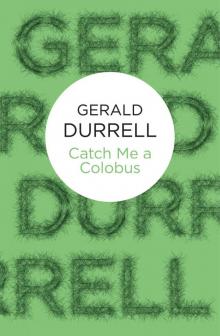 Catch Me a Colobus
Catch Me a Colobus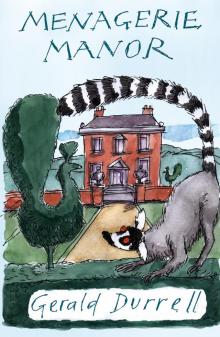 Menagerie Manor
Menagerie Manor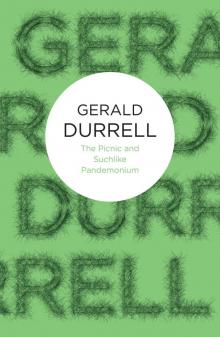 The Picnic and Suchlike Pandemonium
The Picnic and Suchlike Pandemonium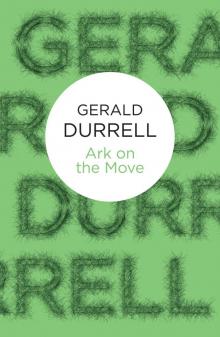 Ark on the Move
Ark on the Move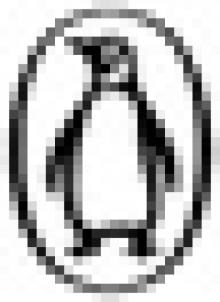 My Family and Other Animals
My Family and Other Animals Two in the Bush (Bello)
Two in the Bush (Bello)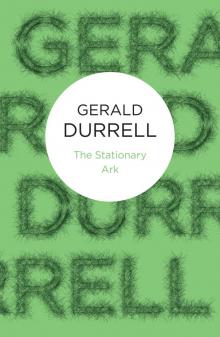 The Stationary Ark
The Stationary Ark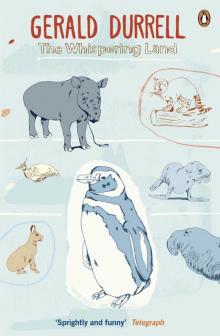 The Whispering Land
The Whispering Land Three Singles to Adventure
Three Singles to Adventure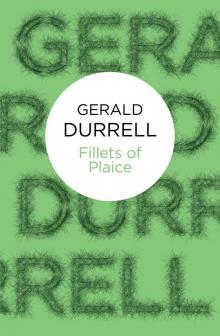 Fillets of Plaice
Fillets of Plaice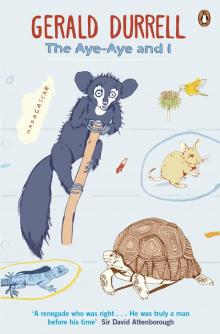 The Aye-Aye and I
The Aye-Aye and I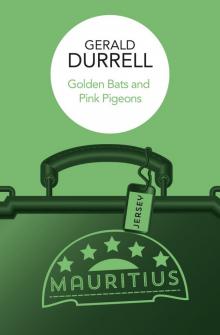 Golden Bats & Pink Pigeons
Golden Bats & Pink Pigeons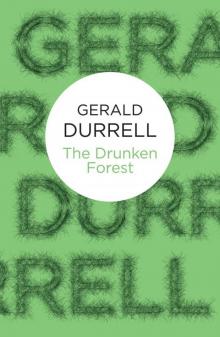 The Drunken Forest
The Drunken Forest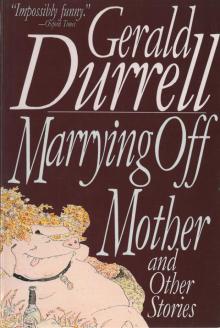 Marrying Off Mother: And Other Stories
Marrying Off Mother: And Other Stories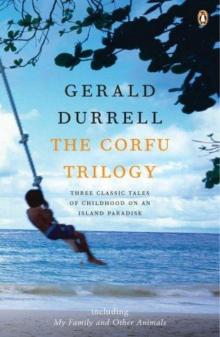 The Corfu Trilogy (the corfu trilogy)
The Corfu Trilogy (the corfu trilogy)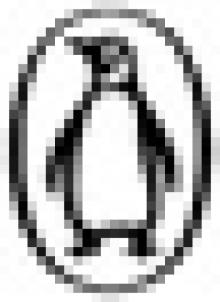 The Corfu Trilogy
The Corfu Trilogy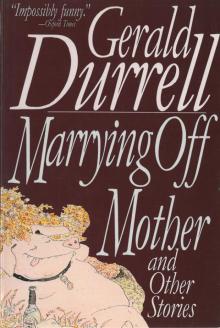 Marrying Off Mother
Marrying Off Mother Two in the Bush
Two in the Bush